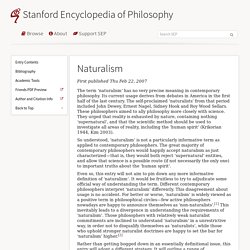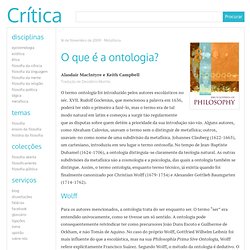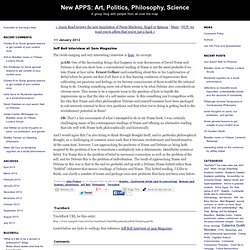

Speculative Realism Pathfinder. This guide was created to help students, faculty, and other interested parties find materials related to the emerging school of philosophical thought known as Speculative Realism. I have linked most of the items listed in the Fundamental Texts section to their Google Books entry in an attempt to make this guide useful to all; Google Books lists the prices of various book retailers and has a "Find in a Library" link which can be used to find a freely-available copy near you. A. Reference Websites These sites provide useful overviews of the Speculative Realism movement as well as its many variants and sub-species. While they range in depth from a blog aggregator with hundreds of posts to a brief encyclopedia entry, all are valuable overviews of the field. Speculative Realism – Wikipedia: A public-edited introduction to the genre of philosophy known as Speculative Realism. Collapse Vol.
What is Actor-Network Theory? ^^Back to the Top^^ B. C. D. E. To the terms themselves! Naturalism. 1.

Ontological Naturalism 1.1 Making a Causal Difference The driving motivation for ontological naturalism is the need to explain how different kinds of things can make a causal difference to the spatiotemporal world. Thus many contemporary thinkers adopt a naturalist view of the mental realm because they think that otherwise we will be unable to explain how mental processes can causally influence non-mental processes. Similar considerations motivate naturalist views of the biological realm, the social realm, and so on. It may not be immediately obvious why this need to account for causal influence should impose any substantial ‘naturalist’ constraints on some category.
However, there may be a posteriori objections to such non-natural spatiotemporal interventions, even if there are no a priori objections. Note how this kind of argument bites directly only on those categories that do have physical effects. 1.2 Modern Science and Causal Influence 1.3 Naturalism and Physicalism. O que é a ontologia? Alasdair MacIntyre e Keith Campbell Tradução de Desidério Murcho O termo ontologia foi introduzido pelos autores escolásticos no séc.

XVII. Rudolf Goclenius, que mencionou a palavra em 1636, poderá ter sido o primeiro a fazê-lo, mas o termo era de tal modo natural em latim e começou a surgir tão regularmente que as disputas sobre quem detém a prioridade da sua introdução são vãs. Alguns autores, como Abraham Calovius, usavam o termo sem o distinguir de metafísica; outros, usavam-no como nome de uma subdivisão da metafísica. Wolff Para os autores mencionados, a ontologia trata do ser enquanto ser.
A influência da escolástica tardia (ou o que Étienne Gilson chama “essencialismo”) na metafísica racionalista foi paga na mesma moeda, pois a divisão da metafísica em ontologia, cosmologia e psicologia reentrou nos manuais escolásticos, onde persistiu até muito recentemente. Kant Heidegger Com respeito à ontologia de Heidegger, o Padre Drennen tem talvez parcialmente razão.
Quine Ser enquanto ser. Jeff Bell interview at 3am Magazine. The (wide-ranging and very interesting) interview is here.

An excerpt: 3:AM: One of the fascinating things that happens in your discussions of David Hume and Deleuze is that you show how a conventional reading of Hume is not the most probable if we take Hume at face value. Ernest Gellner said something about this in his Legitimation of Belief where he points out that if all there is is this buzzing confusion of impressions then cultivating our passions and feelings so we become connoisseurs of them would be the rational thing to do. Creating something anew out of them seems to be what Deleuze also considered an obvious move. This seems to be a separate issue to the question of how to bundle the impressions up so that the idea of a self makes sense.
JB: That’s a fair assessment of what I attempted to do in my Hume book. Why Ethics WITH Ontology? « Ethics WITH Ontology.